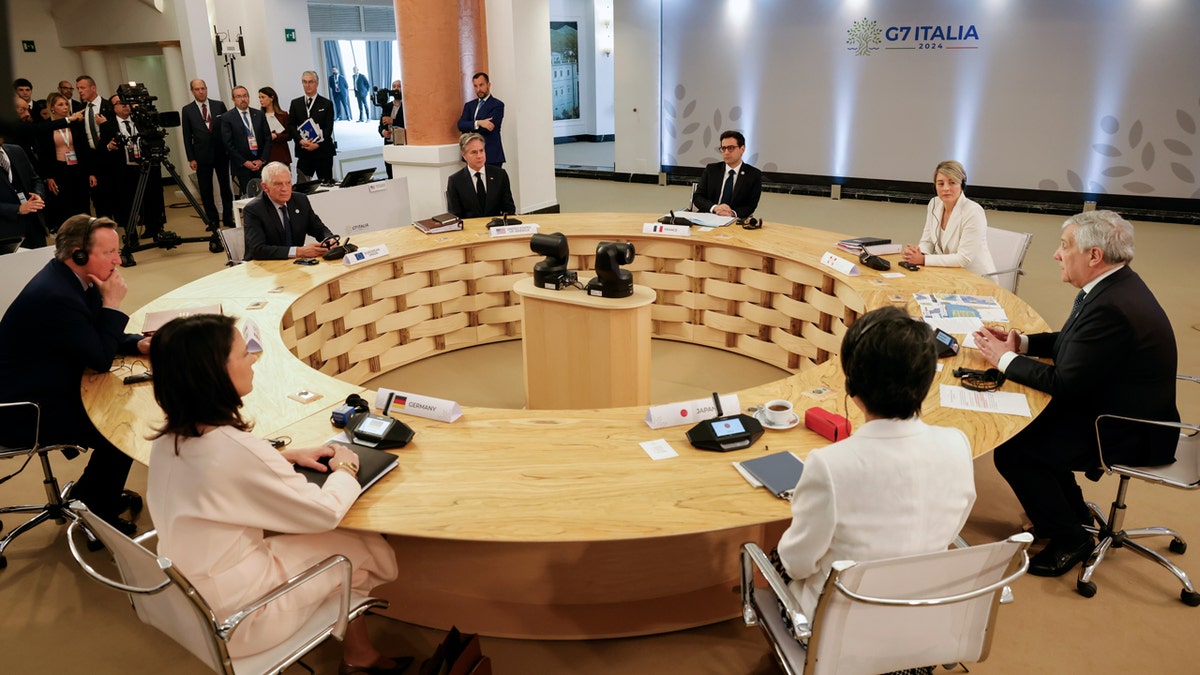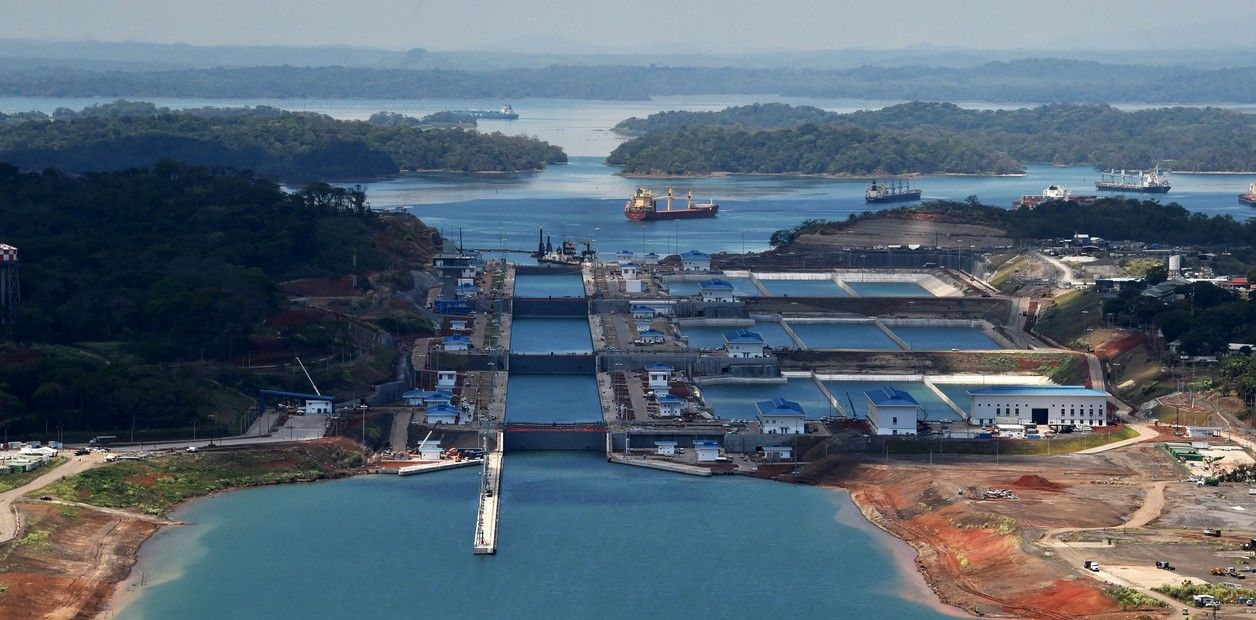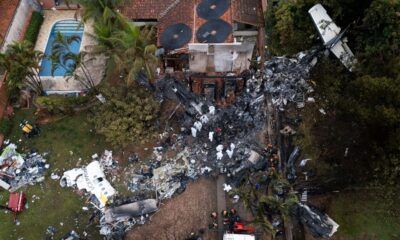INTERNACIONAL
NATO and the EU urge G7 nations to step up air defense for Ukraine and expand Iran sanctions

CAPRI, Italy (AP) — Top NATO and European Union officials urged foreign ministers from leading industrialized nations on Thursday to take quick, concrete steps to provide more air defense systems and artillery to Ukraine, warning that continued delays could tilt the war in Moscow’s favor.
NATO Secretary General Jens Stoltenberg and EU foreign policy chief Josep Borrell addressed a meeting of foreign ministers of G7 nations meeting on the Italian resort island of Capri. Russia’s war on Ukraine and surging tensions in the Middle East over Iran’s unprecedented attack on Israel over the weekend have topped the agenda of the gathering.
TRUMP SAYS US WILL ‘100%’ STAY IN NATO IF ALLIANCE TREATS AMERICA ‘FAIRLY’
Without more Patriot air defense missile systems to protect against Russian strikes, «the electricity system of Ukraine will be destroyed. And no country can fight without having electricity at home, in the factories, in the front line,» Borrell told reporters on the sidelines of the event.

British Foreign Secretary David Cameron, left, European Union foreign policy chief Josep Borrell, top left, U.S. Secretary of State Antony Blinken, top, second from left, German Foreign Minister Annalena Baerbock, bottom left, Japanese Foreign Minister Yoko Kamikawa, bottom right, Canadian Minister of Foreign Affairs Mélanie Joly, top right, French Foreign Minister Stephane Sejourne and Italian Foreign Minister Antonio Tajani, right, meet on the second day of a G7 foreign ministers meeting on Capri island, Italy, Thursday, April 18, 2024. (AP/Remo Casilli)
Stoltenberg welcomed signs that the U.S. Congress might soon vote on a $61 billion aid package for Ukraine, the bulk of which would go to purchasing weapons and ammunitions from U.S. defense manufacturers. And he welcomed other recent financial pledges from the Netherlands and Denmark as well as Germany’s recent announced delivery of a new Patriot missile battery.
But he said more long-term and sustainable aid was necessary to better coordinate Ukraine’s response over the long term.
«There is an urgent, critical need for more air defense,» Stoltenberg said, adding that artillery rounds were also needed. «We cannot continue to be in a situation where Russia is outgunning Ukraine, in the way they do now. The Russians are shooting and shooting, and the Ukrainians have limited resources to shoot back. So the Ukrainians need more, and that’s the urgent and important message from me to all allies.»
Italian Foreign Minister Antonio Tajani opened the first working session by calling for new sanctions against Iran for its weekend attack and concrete help for Ukraine. «If Ukraine loses, (Russian President Vladimir) Putin will never sit at the peace table,» Tajani warned.
The Capri meeting of the top diplomats from Britain, Canada, France, Germany, Italy, Japan and the United States dovetailed with other regional diplomatic efforts sending the same messages. On Wednesday, EU leaders meeting in Brussels vowed to ramp up sanctions on Iran to target its drone and missile deliveries to proxies in Gaza, Yemen and Lebanon.
The U.S. and Britain, meanwhile, announced Thursday they were imposing a new round of sanctions on Iran, with the U.S. targeting individuals and entities that produce engines that power drones and are involved in steel production. The latest British measures target several Iranian military organizations, individuals and entities involved in Iran’s drone and ballistic missile industries.
Borrell said the existing EU sanctions regime would be strengthened and expanded to punish Tehran and help prevent future attacks on Israel. At the same time, he said, Israel needed to exercise restraint.
«I don’t want to exaggerate but we are on the edge of a war, a regional war in the Middle East, which will be sending shockwaves to the rest of the world, and in particular to Europe,» he warned. «So stop it.»
German Foreign Minister Annalena Baerbock said Iran must be isolated «because,of course, there must be a reaction to this unprecedented incident, but there must be no further escalation in the region,» German news agency dpa reported.
On Ukraine, its Foreign Minister Dmytro Kuleba, who was invited to Capri as a guest, underlined his country’s need for essential military support, including artillery, ammunition, and air defense systems as Russia pushes along the front line.
He thanked Germany for providing Ukraine with a new Patriot battery, which was announced over the weekend, but urged the U.S. Congress to quickly approve the funding package.
«So we will work here at the ministerial level to make other allies deliver air defense systems to Ukraine. Because it’s of fundamental importance,» Kuleba said.
President Joe Biden said Wednesday he supported a proposal from the House speaker, Mike Johnson, to provide about $61 billion in aid for Ukraine, signaling bipartisan support for the precarious funding bill.
U.S. Secretary of State Antony Blinken said he hoped the U.S. funding would come through but said other allies needed to step up.
«In this moment, it is urgent that all of the friends and supporters of Ukraine maximize their efforts to provide Ukraine with what it needs to continue to effectively defend itself against this Russian aggression,» Blinken said after meeting with Kuleba.
«If Putin is allowed to proceed with impunity, we know he won’t stop at Ukraine and we can safely predict that his aggression will continue,» Blinken said. «Other would-be aggressors around the world will take note and unleash their own aggressions. And we will have a world of conflict, not a world of peace and security.»
CLICK HERE TO GET THE FOX NEWS APP
Borrell said Europe can’t rely solely on Washington to help Ukraine defend itself.
«Concrete decisions have to be taken in order to send to Ukraine more air defense,» he said. «We do have Patriots, we have anti-missile systems. We have to take them from the our barracks where they are just in case, and to send to Ukraine where the war is raging. And I’m sure we will be doing that, but it has to be done quickly.»
INTERNACIONAL
Por el precio de las tarifas, Donald Trump amenaza con la reconquista del Canal de Panamá y provoca fuertes críticas

Repudio panameño
-
POLITICA3 días ago
Patricia Bullrich le respondió a Victoria Villarruel tras las críticas por el gendarme detenido en Venezuela
-
POLITICA2 días ago
El descargo de Longobardi tras su salida de Radio Rivadavia: «Me hizo acordar cuando Cristina ejecutó mi despido en Radio 10»
-
INTERNACIONAL2 días ago
Atropello múltiple en un mercado de Navidad en Alemania: al menos dos muertos y más de 60 heridos
-
POLITICA2 días ago
Guillermo Castello: «Kicillof está utilizando la caja de la provincia para posicionarse políticamente»
-
POLITICA22 horas ago
Nisman: el Gobierno acepta el pedido del fiscal y levanta el secreto sobre los espías inorgánicos de la SIDE y el Ejército
-
CHIMENTOS1 día ago
Se confirmó el escandaloso motivo de la crisis entre Javier Milei y Yuyito González: «Él estaba cerca de Graciela Alfano»









































